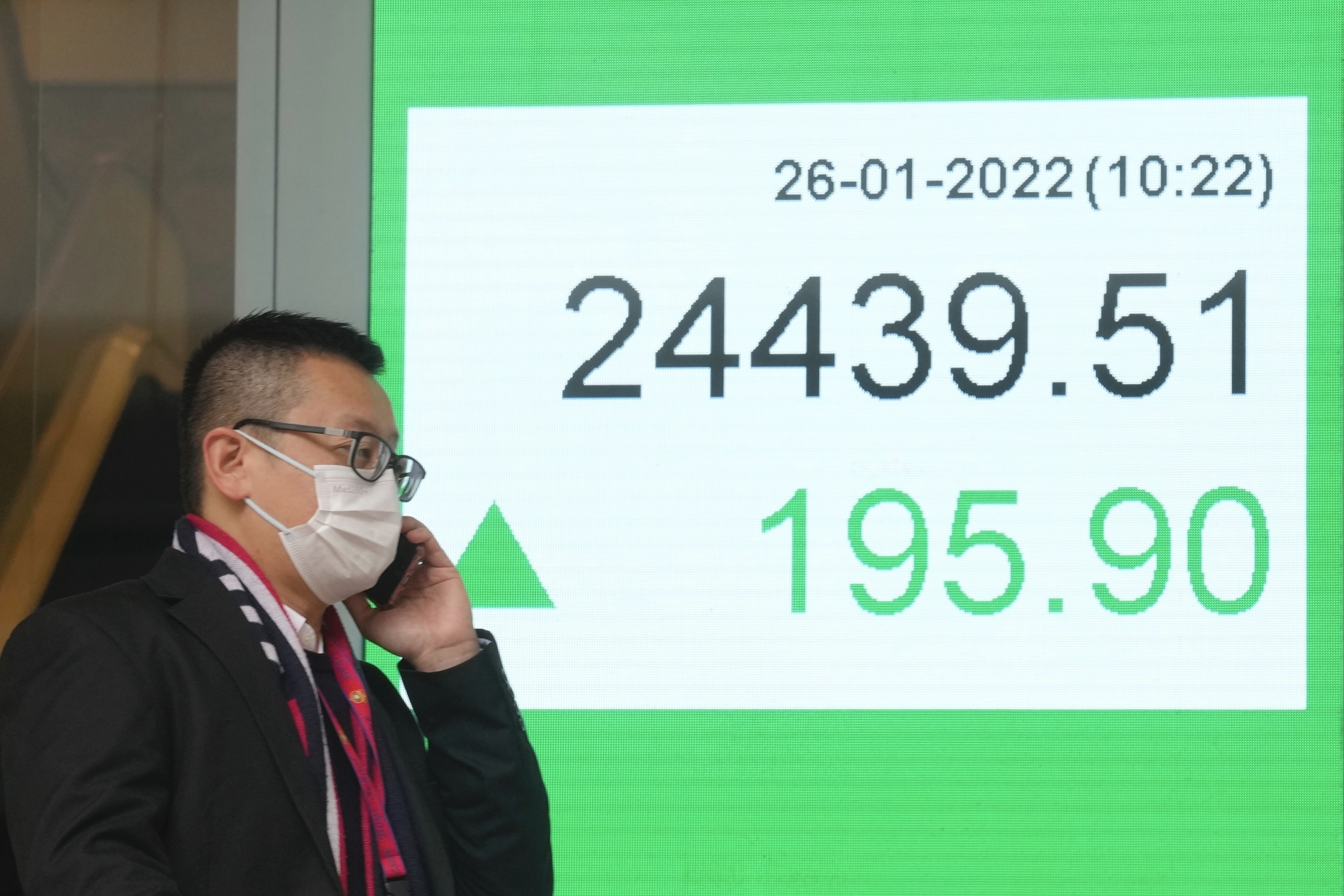 1
1 1
1
BEIJING (AP) — Asian stock markets tumbled by unusually wide margins Thursday after the Federal Reserve indicated it plans to start raising interest rates soon to cool inflation.
Market benchmarks in Tokyo and Hong Kong fell by more than 2%. Seoul and Sydney sank nearly 3%.
Wall Street’s benchmark S&P 500 index lost 0.1% on Wednesday after a Fed statement said the U.S. central bank “expects it will soon be appropriate” to raise rates. Investors expect as many as four rate hikes this year, starting in March. The Fed also said monthly bond purchases that push down long-term rates by injecting money into the financial system would be phased out in March.
“The odds of a more aggressive front-loading of rate hikes should no longer be dismissed,” Philip Wee and Eugene Leow of DBS Group said in a report. If inflation fails to decline ahead of the Fed’s March meeting, “there may be more catch up to do.”
The Nikkei 225 in Tokyo fell 2.5% to 216,339.53 and the Hang Seng in Hong Kong sank 2.2% to 23,753.94. The Shanghai Composite Index lost 0.9% to 3,423.60.
The Kospi in Seoul retreated 2.9% to 2,630.65 and Sydney’s S&P 500 was off 2.6% at 6,782.50.
New Zealand and Singapore declined while Jakarta and Bangkok advanced.
On Wall Street, the S&P 500 slipped to 4,349.93 after being up 2.2% ahead of the Fed announcement.
The Dow Jones Industrial Average fell 0.4% to 34,168.09. The Nasdaq composite was little-changed at 13,542.12, shedding a 3.4% gain earlier in the day.
Wall Street rose immediately after the Fed statement but major indexes gave up their gains as Chair Jerome Powell took questions about how and when the central bank will start letting its balance sheet shrink after buying trillions of dollars of bonds through the pandemic. That would put upward pressure on market interest rates.
The selling accelerated as Powell acknowledged high inflation that has squeezed businesses and consumers isn’t getting better. That could force the Fed to get even more aggressive about raising rates and removing the support it put in place for markets.
The last time the Fed raised rates and shrank its balance sheet at the same time was in late 2018. The S&P 500 lost nearly 20%.
“Since the December meeting, I’d say the inflation situation is about the same but probably slightly worse,” Powell said. “It hasn’t gotten better. It’s probably gotten just a bit worse, and that’s been the pattern.”
Powell also said that there’s room to raise interest rates without hurting the labor market, and wouldn’t rule out the possibility that the Fed could raise short-term rates at any of its seven remaining meetings this year or opt for a larger-than-usual increase at any one of them.
The Fed’s near-zero interest rates helped to boost stock prices for nearly two years, but markets have been volatile since Powell and other officials in mid-December said plans to wind down economic stimulus might be accelerated to fight surging inflation.
In energy markets, benchmark U.S. crude lost 43 cents to $86.92 per barrel in electronic trading on the New York Mercantile Exchange. The contract rose $1.75 to $87.35 on Wednesday. Brent crude, the price basis for international oils, shed 47 cents to $88.27 per barrel in London. It advanced $1.76 the previous session to $89.96.
The dollar edged up to 114.57 yen from Wednesday’s 114.55 yen. The euro declined to $1.1228 from $1.1254.